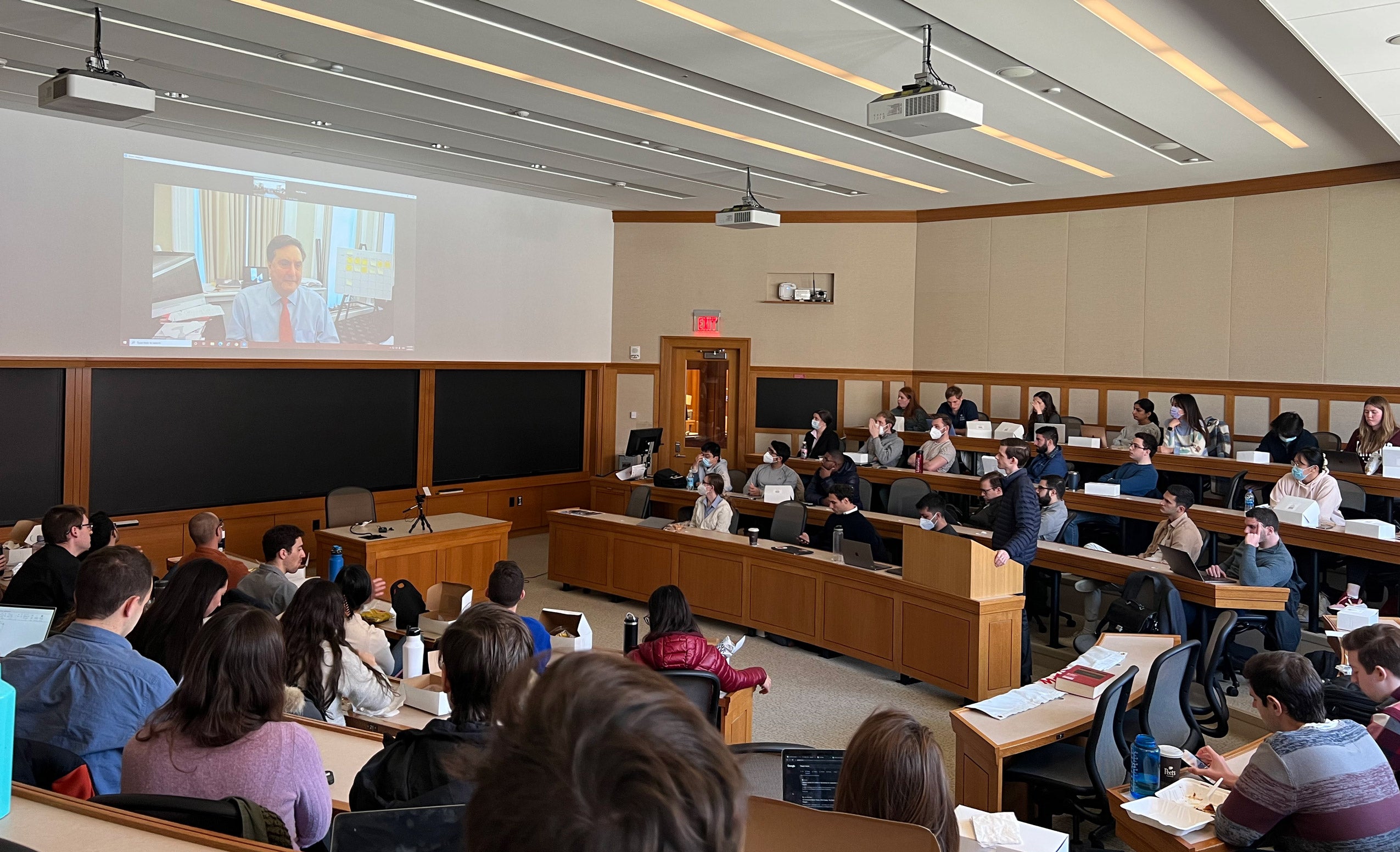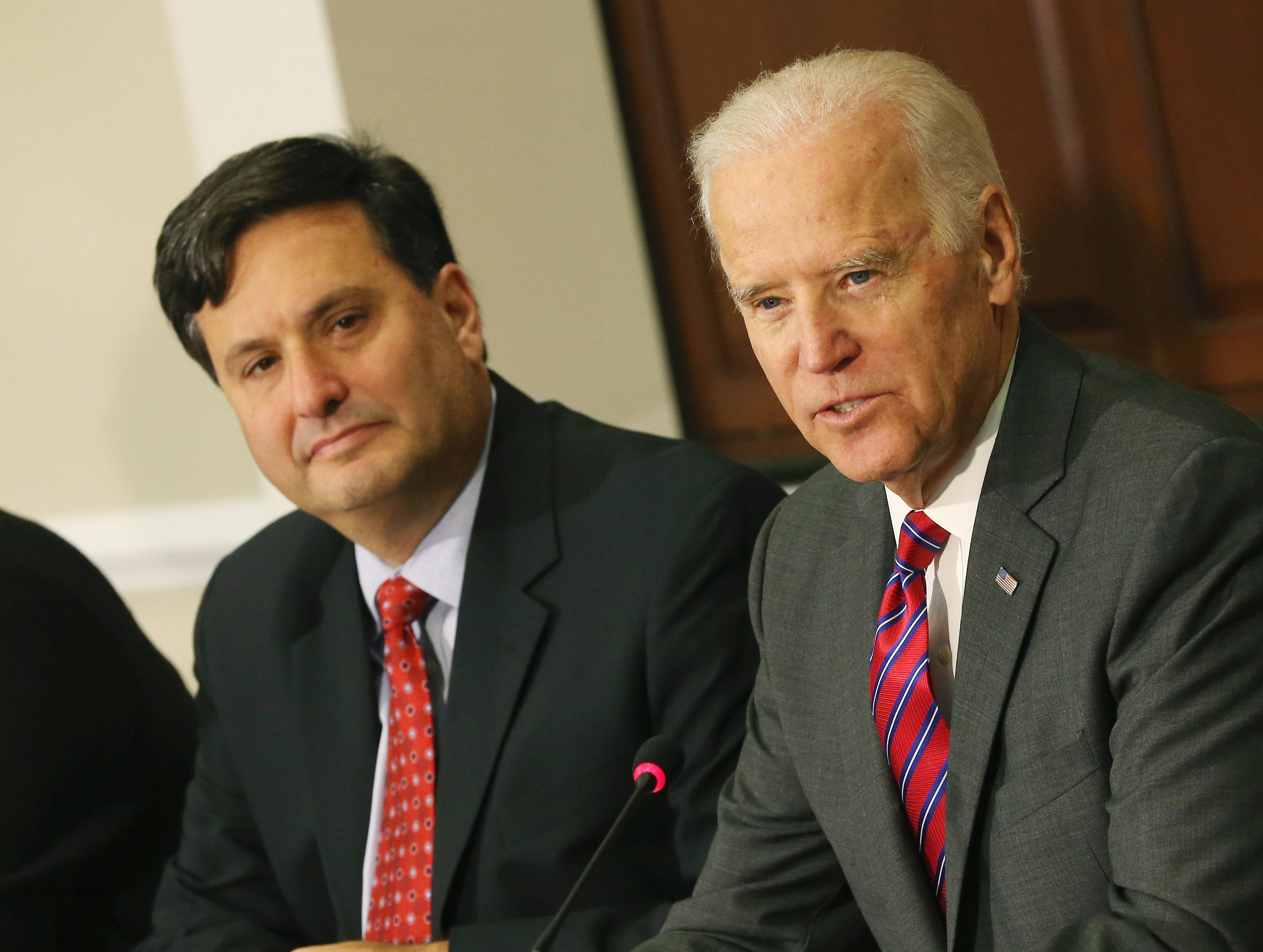“Elections are fundamentally about two things. One, they’re a battle of ideas — what we stand for, versus what they stand for. And secondly, they’re a battle of organizations, who we get activated out to the polls,” White House Chief of Staff Ron Klain ’87 told Harvard Law School students at an event last week. “And I think there’s a great chance for people at HLS — people everywhere — to get active in either or both of those things.”
Klain, an attorney and political consultant who oversaw President Bill Clinton’s judicial nominations, and who also served as chief of staff to vice presidents Al Gore and Joseph Biden, was speaking to a packed classroom via Zoom at a discussion hosted by the Harvard Law School Democrats on March 30.
Klain answered the audience’s questions about the administration’s agenda on voting rights, student loan debt, global vaccine inequities, the war in Ukraine, and other hot topics. He also offered advice to students interested in pursuing policy roles after graduation, and urged them to volunteer their time in races up and down the ballot before the midterm elections.
After thanking students for their work with the HLS Democrats, Klain started by describing what he called a “productive 14 months” since President Biden took office, with, he said, “a record-setting number of federal judges, record job creation, success in our passing our infrastructure bill, success in doing a number of things through executive actions with regard to the environment, voting rights, health care…”
Klain said that the administration was “close to the finish line” on confirming nominee Ketanji Brown Jackson ’96 to the Supreme Court of the United States, and that President Biden was eager to move forward on his economic and climate agendas, among other pressing issues.

On opening the discussion to questions, one student asked how the Biden administration was addressing vaccine access across the globe. The student said he was particularly concerned about U.S. companies that had developed the COVID-19 vaccine with public money and have thus far refused to share the science more broadly.
Klain responded that there are two separate problems in play that contribute to inequitable access to vaccines in developing countries. “There are more than enough vaccines right now that we can’t deliver,” he said, adding that many countries lack the clinics, staff, and cold-chain technology necessary to safely deliver the 100 million shots currently in storage. He said the administration was working hard to help countries increase their capacity to accept and deliver these doses.
Then, he said, there are intellectual property concerns. “I think in terms of the long-run issues that you raised, there’s no question we need to find a way to create more capacity in more countries in the world to produce their own vaccines, to have vaccine independence.”
Another student wondered what the Biden administration was doing to reduce mass incarceration in the U.S.
“The Justice Department… announced that virtually everyone who is out right now on CARES Act and COVID-related releases is not going to have to go back to prison,” said Klain. “And that affects thousands of people, and I think is the largest one-time de-incarceration act that any administration has ever done.” (The dispensation applies to federal inmates only.)
Klain said the Biden administration was also focusing on granting clemency for nonviolent offenses to keep people out of prison. But he was skeptical about the potential for bipartisan action. “I was hopeful that we could take some of the bipartisan criminal justice reform that had passed in both the Obama administration and the Trump administration and take it another step further,” he said, but that he believed the Republican Party had soured on that idea.
And as the war in Ukraine continues to drag on, several people were curious about President Biden’s strategy for the conflict, including how the U.S. weighed the need to show strength and leadership without escalating tensions.
“As you said, it’s a bit of a balance between confronting Russian aggression effectively, and also making it clear [we] understand that, whether we see it as rational or not, there was a widespread belief in Russia that the deployment of extensive U.S. forces in the eastern NATO countries represents a military threat to Russia,” he said. “And so, what we’ve tried to do is be very clear about our intentions, be very clear about where we stand, and inside the confines of that, provide extensive lethal aid to the Ukrainians in their fight against Russian invaders,” which has included “tens of thousands of pieces of defensive weaponry [and] millions of pieces of ammunition.”
But, Klain said, “The clear lines of escalation we have not crossed are that we have not sent any U.S. troops to confront Russian troops — we have not done that either on the ground or in the air via a no-fly zone. And those are lines of de-escalation we’re going to hold to.”
Klain also said the administration has committed to helping the European Union reduce its dependency on Russian natural gas through building more LNG (liquefied natural gas) export terminals in the U.S. and import terminals in the E.U.
Turning to the midterm elections in November, “It seems to be a foregone conclusion that the House [of Representatives] is going to flip,” one student predicted. What was the administration’s plan for its agenda if that happened?
“First of all, I don’t accept the idea that the House is going to flip,” said Klain, noting that redistricting had helped Democrats in some regions, and that the small number of seats in play allow the president and vice president to visit the most competitive districts before the election. “Likewise, I’m optimistic about the outcome in the Senate. I think that we’ve got five incumbents who have tough races, but I think all five of them are eminently winnable.”
But regardless of the outcome of the midterms, “We’re always going to try to find ways to get things done,” he said. “We’re always going to try to find ways to work with both Democrats and Republicans as we did on the infrastructure bill and as we are now [doing] on the bipartisan Innovation Act. As I think we’ll be able to get done successfully on some of the items that president identified in his unity agenda at the State of the Union, like beefing up our fight against cancer, helping veterans who’ve been the victims of burn pits, and other things where there’s some bipartisan support.”
Klain left the students with a few words of advice on how to build a career in policy and political campaigns.
“Start somewhere,” said Klain. “You need to be a little brave to do it, because you’re going to have to make your own path. You’re going to have to go out and find those opportunities, find the campaigns to get involved in, and find the elected officials to work for. … There’s no magic to it.”
And importantly, Klain said, get involved in campaigns at the local level as well as the national. Knock on doors, make phone calls. “It’s a great experience, for those who haven’t been involved in politics before to really see how the rubber meets the road, what arguments are persuasive with voters,” he said, of phone banking.
“There’s just no experience that replaces asking people for their vote. Seeing what makes people say yes, and what makes people say no … helps [make for] better politics.”
